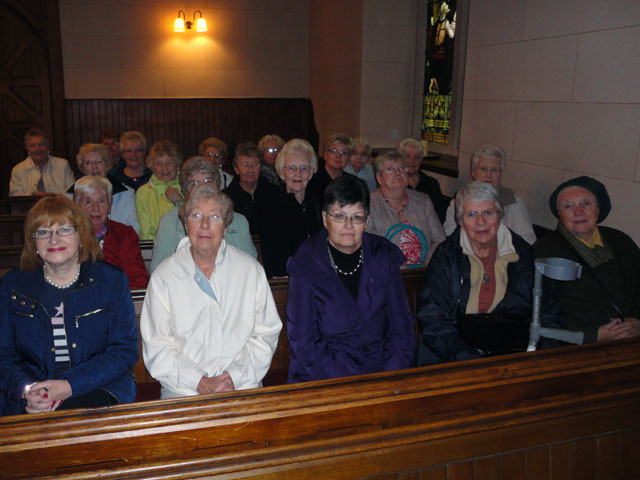Blog
Meditations
How Are Women to Keep Silent in the Churches?
Thursday, February 28, 2019

A week or two ago, one of my Facebook friends posted a link to this blog. Among other things, one of the author’s main goals appears to be insisting that women should be allowed to speak in the assemblies of churches of Christ. This post is representative of his arguments.
The post is, quite honestly, very long, and I don’t have space to respond to everything in it that I think is mistaken (not without turning this into the 1 Corinthians 14 blog, at least!). However, I think it’s worthwhile to address one of the author’s primary arguments—that no church of Christ is consistent in applying 1 Corinthians 14:34-35 because in none of them are women absolutely silent. He writes, “Hardly a single woman remains silent in the churches. Women sing. They greet people. They say ‘good morning’ and ‘Amen.’ They make comments in Sunday School. They give confession to the assembly before baptism.”
What the author describes is true, so far as it goes. However, it’s not in conflict with the plain meaning of 1 Corinthians 14. First of all, this text applies to times “when the whole church is assembled together”—what we would call worship services rather than Bible classes (though I think that churches need to apply 1 Corinthians 14 to their Bible classes if said classes are an assembly of the whole. The label we assign an activity is less important than the reality of what we’re doing.).
Second, though we tend to focus on women, sisters in Christ are not the only group in the chapter that Paul instructs to be silent. In 1 Corinthians 14:28, he tells men with the gift of tongues to keep silent if there is no interpreter present. In 1 Corinthians 14:30, he tells prophets to keep silent if a revelation has been given to another prophet.
In these passages, it’s clear that “silent” isn’t contrasted with making a sound. Otherwise, gifted men under these conditions would have been barred from singing, saying “Amen”, and otherwise participating in public worship. That interpretation can’t be supported from the text, particularly when Paul urges brethren to earnestly desire spiritual gifts in 1 Corinthians 14:1. Why desire something that could bar you from worshiping?
Instead, “silent” in 1 Corinthians 14 is contrasted with being the speaker. Tongue-speakers and prophets in these circumstances were free to participate in public worship. They were not free, however, to claim center stage for themselves.
The same rule applies to women. They too are free to say the “Amen” if they agree, as per 1 Corinthians 14:16. They too are free to obey the exhortation of Romans 15:6 and join in glorifying God with one voice. They are not free, however, to become the speaker.
There were circumstances in which tongue-speakers and prophets could become the speaker in an assembly. Tongue-speakers were permitted to do so in the presence of an interpreter. Prophets were permitted to do so (one by one, two or three at most per assembly) in the absence of another revelation. However, there are no circumstances in which the text permits women to do the same. Paul’s prohibition is absolute, even to the point of forbidding women to ask questions in such circumstances.
Such a commandment is opposed to the spirit of our time. That’s not in question. The question is if we are willing to defy the spirit of our time to follow the Spirit of God. Honoring His word will not find favor with our culture, but it will find favor with Him.
Is Socialism a Biblical Concept?
Thursday, February 21, 2019

Much to my surprise, for the first time that I can remember since the Cold War, there is a flurry of national interest in socialism. As someone who is a student of history, this concerns me. As someone who is politically unaligned, I’m not sure what to do about it.
I have seen, though, a small minority of brethren with left-leaning political views justify their embrace of socialism by pointing to the communal practices of the first-century church. They cite texts such as Acts 4:32, which reads, “And the congregation of those who believed were of one heart and soul, and not one of them claimed that anything belonging to him was his own, but all things were common property to them.” Ergo, the argument goes, adopting a democratic-socialist form of government is Biblically acceptable, if not outright Biblically justified.
From my perspective, though, the argument appears to suffer from the usual problems with basing public policy on the Bible. New-Testament Christianity is concerned with the conduct of individuals and small groups, not nations. It assumes that those individuals and groups will be motivated to obey by love. The less true those things are, the less applicable the code of the Bible becomes.
Take, for instance, Acts 4:32. It certainly describes a communal moment in the history of the early church. However, we see plainly in the text that everyone who was involved in sharing their possessions did so willingly. If a group of people chooses to pool their possessions, whether Christians or not, I don’t have a problem with that.
However, socialism is never 100 percent voluntary. No political system is. It invariably involves coercion. Somebody who is a citizen of a socialistic country but doesn’t want to have his possessions redistributed will have those possessions redistributed forcefully.
I think that generosity among brethren is beautiful. I think that forced redistribution is hideous. It is provoked by greed, not love. Historically speaking, lots of people have died in the course of state redistribution of property.
Second, Acts 4 captures a particular moment in time. It comes on the heels of the establishment of the church on the day of Pentecost, during which thousands of Jews from all over the world who were in Jerusalem for the festival obeyed the gospel. Most of those converts didn’t own property in Jerusalem. They didn’t have employment there.
As a result, if they wanted to remain in Jerusalem and be taught, they had to rely for their needs on others. The native Christians were driven to sell their property to meet the need. This took place only for a limited time, and if the situation had continued indefinitely, it would have been unsustainable. There’s a sense in which the persecution of Saul did the Jerusalem church a favor by forcing it to scatter.
Political socialism, by contrast, does not advocate state assumption of assets as a limited-term response to a crisis. Instead, to at least some degree, it contemplates the permanent collectivization of property. This too is unsustainable. People who are not motivated by the prospect of reward will not work.
In summary, there is a facial resemblance between the economics of the Jerusalem church and socialism, but the parallel doesn’t stand up under scrutiny. What a church might do when many of its members are in need has little to do with how a nation should organize itself. As always, we are on solid ground when we seek to apply the word of God to ourselves and our churches. The more we stray from the intent of the Holy Spirit, the more fraught the exercise becomes.
Temptation by Overstatement
Friday, February 15, 2019

During my Texas travels a couple weeks back, I worshiped on Sunday morning with the Kleinwood church in northwest Houston, where my in-laws are members. That evening, Brent Moody preached on Genesis 3. He pointed out that the devil still tempts us today using the same strategies that he used to tempt Eve in the garden of Eden.
I thought Brent made several good points in the course of the sermon, but his first particularly stuck with me. He focused on the devil’s statement in Genesis 3:1, “Indeed, has God said, ‘You shall not eat from any tree of the garden’?”
As Brent pointed out, this was not a diabolical request for information. The devil knew perfectly well that God had not said any such thing. Indeed, he knew that Eve knew that God had not said any such thing.
Instead, the devil’s goal was to sow doubt. It would have been unreasonable, irrational, for God to command Adam and Eve not to eat from any of the trees in the garden. What else were they supposed to eat? God didn’t say any such thing, but the devil’s suggestion that he did cast doubt on God’s wisdom, with later, catastrophic effects.
If we pay attention, we will see that the devil frequently tries the same strategy with us. The most obvious case I’ve ever encountered was in a study with a young woman who was a new convert. She had had some association with the churches of Christ in her past, but she knew very little.
During this study, which took place shortly after she was baptized, she asked me, “Now that I’m a Christian, I can’t listen to any more music in my car, right?” She had confused the Bible’s teaching about a-cappella worship with a general prohibition of listening to any instrumental music, ever.
As with not eating of any of the trees in the garden, such a prohibition would be ridiculously overbroad. In fact, it would be impossible to live in our society if such a commandment existed. Music is everywhere, and we wouldn’t be able to watch TV, sit in a doctor’s office, or even walk down the street without sinning.
Once the devil puts the notion in our minds that God might be so unreasonable, though, he opens the door for the suggestion that God’s actual commandments are either unreasonable or much less restrictive than we think. “God doesn’t really expect me to be intimate only with my spouse, does He?” All of a sudden, the devil has maneuvered us into the seat of judgment ourselves, and once we start living based on what is right in our own eyes, we’re dead meat! Indeed, after a short while, I never saw this sister in Christ again.
Ignorance of the word can be much more dangerous than we think. It leaves us vulnerable not only to direct temptation, but also to misrepresentation of the Scriptures, if only by ourselves to ourselves. The only cure for the disease is to hide the word of God in our hearts, so that no satanic overstatement ever can find any room there.
The Hope That Is in Us
Wednesday, February 13, 2019

Like most Christians, I’ve heard plenty of teaching on 1 Peter 3:15. Indeed, I’m responsible for a fair amount of it myself. Typically, and rightly so, this verse is often brought up in the context of evangelism. In particular, teachers are concerned with the phrase, “Being prepared to make a defense.” They use it to argue that we need to Know Our Bibles. Gotta be ready to debate all those deluded denominationalists right into the baptistry!
However, during my recent Texas odyssey, I heard a fascinating sermon from Jeff Wilson that pointed out that this application is misguided. The text doesn’t say, “Being prepared to make a defense to anyone who asks you for a reason for your specific beliefs on salvation.” Instead, it says, “Being prepared to make a defense to anyone who asks you for a reason for the hope that is in you.”
That’s very different. We might be tempted to slap a generic definition on “hope”, but the context doesn’t allow us to do that. In 1 Peter 1:3-4, Peter is very specific that the hope is our hope of an eternal inheritance in heaven.
Indeed, he is very specific about the reason for that hope. It is the resurrection of Jesus Christ from the dead. When we are making a defense of the reason for the hope that is in us, we are talking about the resurrection and what it means for us.
1 Peter 3:15 is thus another piece of evidence that first-century Christianity was much more resurrection-centric than its 21st-century variant often is. “The gospel” isn’t the 27 books of the New Testament. It is the good news that eternal life is possible through the risen Lord. The vast importance of the cross is undeniable, but without the empty tomb, the cross is meaningless. Don’t take my word for it. Take Paul’s word for it, in 1 Corinthians 15:17.
“But what about baptism???” the legions of battle-hardened personal workers might cry. Frankly, if our teaching on baptism doesn’t start with the resurrection, we’re doing it wrong. As per Romans 6, baptism is best understood as a spiritual union with the death, burial, and resurrection of Christ. If you are buried with Him, you will rise to walk in newness of life like He did.
In fact, the more we exalt the resurrection, the more we also exalt baptism. If the resurrection is the central event of Christianity, it ought also to be the central event of becoming a Christian. What does the sinner’s prayer have to do with the resurrection? Nothing! What does baptism have to do with the resurrection? Everything!
This is the hope that is in us, the hope that we must defend whenever anyone asks. Christ is alive! The Scriptures prove it. Because He is alive, we can live too if we follow Him.
If that’s the defense we make, we might find a whole lot more people who are willing to listen.
Compassion in Jonah
Friday, February 08, 2019
.jpg)
A few weeks ago, after I finished going through Jonah in my daily Bible reading, I posted on Facebook, “I love the book of Jonah! It is both warm and subtle.” In what is perhaps a sign that I deadpan too much on Facebook, most who responded thought I was joking. Those who took me seriously, seriously disagreed.
Apparently, an explanation is in order!
I think part of the problem is that when most Christians think of Jonah, they think of the eponymic prophet and his encounter with the not-whale. The story is dramatic, but it is admittedly not very cozy. However, the book is not about Jonah’s ingestion by a great fish, nor even about his preaching mission to Nineveh. As impressive as those things are, they’re not the point. Instead, the theme of the book is God’s efforts to teach His wayward prophet compassion.
Think about it. In the opening scene of the book, God tells Jonah to go to Nineveh, and Jonah heads in the opposite direction, presumably because he isn’t terribly interested in saving the Ninevites. At this point, God would have been fully justified in turning Jonah into a grease spot. However, he doesn’t. Instead, He sends Jonah on his undersea journey to give him time to repent, just as He wants to give Nineveh time to repent.
Jonah does, and once he’s back on dry land, he grudgingly goes to Nineveh. Then, he warns the people of God’s impending judgment, even though he really wants to see them destroyed. However, the outcome is exactly what God wants to see, and exactly what Jonah doesn’t want to see. The city repents en masse, and disaster is averted.
Jonah, however, remains as hard-hearted as ever. He camps out on the hills above the city, hoping that God will change His mind and destroy it (the opposite of Abraham’s perspective on Sodom, if you think about it). In one last attempt to correct His wayward prophet, God raises up a plant to shade him and then kills it. When Jonah gets upset, God points out that if Jonah is right to get emotionally attached to a plant, God is right to feel compassion for a city filled with human beings.
This is a story that gives me a great deal of hope. It clearly reveals the depth of God’s compassion, not only for Nineveh, but for one of His own who repeatedly refuses to get it. I’m glad I serve a God like that, not least because of all the times when I have repeatedly refused, and probably still do repeatedly refuse, to get it. I am a daily witness to the greatness of His mercy.
Second, the story of Jonah illustrates God’s patience. Despite multiple provocations, God doesn’t give up on Jonah. Instead, He continues teaching him, right up to the last sentence of the book. As a disciple of Jesus, I know that I am very much a work in progress, and I am thankful that God will patiently continue His work in me and not give up on me.
Is a book filled with storms and judgments stereotypically warm? Well, no, but every time I read it, I find myself warmed anyway. The conflict in it isn’t God’s fault, but Jonah’s. The compassion, though, all belongs to God.


